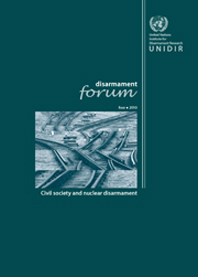The international political environment is at its most receptive point in decades to the concept of nuclear disarmament and abolition. It is also widely perceived that the objective of nuclear abolition will take some time to reach—witness President Barack Obama's often quoted 2009 Prague declaration that a world without nuclear weapons is a goal that will not be reached quickly, and will take patience and persistence to achieve.
The nuclear abolition movement has been patient and persistent. Some might say that the movement has been too patient and has weakened since the end of the Cold War. Current political conditions have provided an opportunity to reinvigorate the movement. But where is the mass movement? In the unprecedented networked era in which we live, why does the movement seem to be so dispersed and fragmented? A wealth of organizations and campaigns—new and old—seem to be competing for audience, for financial resources, for visibility. Or is this just a symptom of campaigns in the era of social media? Should we stop looking for demonstrations in the streets and rather turn our attention to Facebook, Twitter and YouTube?
This issue of Disarmament Forum considers the question of civil society and nuclear abolition. How can the objective of nuclear disarmament and abolition once again captivate and motivate the public as it did during and even immediately following the Cold War? Are there lessons that could be drawn from more recent (and more successful) civil society movements in other areas of disarmament? What are the steps to building civil society partnership into the nuclear disarmament dialogue? How can we ensure a “seat at the table” for civil society on nuclear issues, as has been achieved recently with landmines and cluster munitions—where civil society was a valued partner in the process, not marginalized to the role of cheerleader outside the negotiating chamber? The expert contributions to this issue address these questions and more in a manner that is both thought-provoking and forward-looking.
Citation: Kerstin Vignard (ed.) (2010). "Disarmament Forum: Civil Society and Nuclear Disarmament", UNIDIR, Geneva.
Disponible aussi en français.
Content
- Editor’s note, Kerstin Vignard
- Where is the nuclear abolition movement today? Lawrence S. Wittner
- Generations of change: persuading post-Cold War kids that disarmament matters, Nina Eisenhardt and Tim Wright
- From aspiration to success: shaping civil society action to change nuclear weapons policy, Alyn Ware
- Now we can: civil society and governments moving toward a ban on nuclear weapons, Dimity Hawkins
- Nuclear disarmament, civil society and democracy, Andrew Lichterman
- Close encounter with nuclear deterrence, Robert Green
- UNIDIR focus
